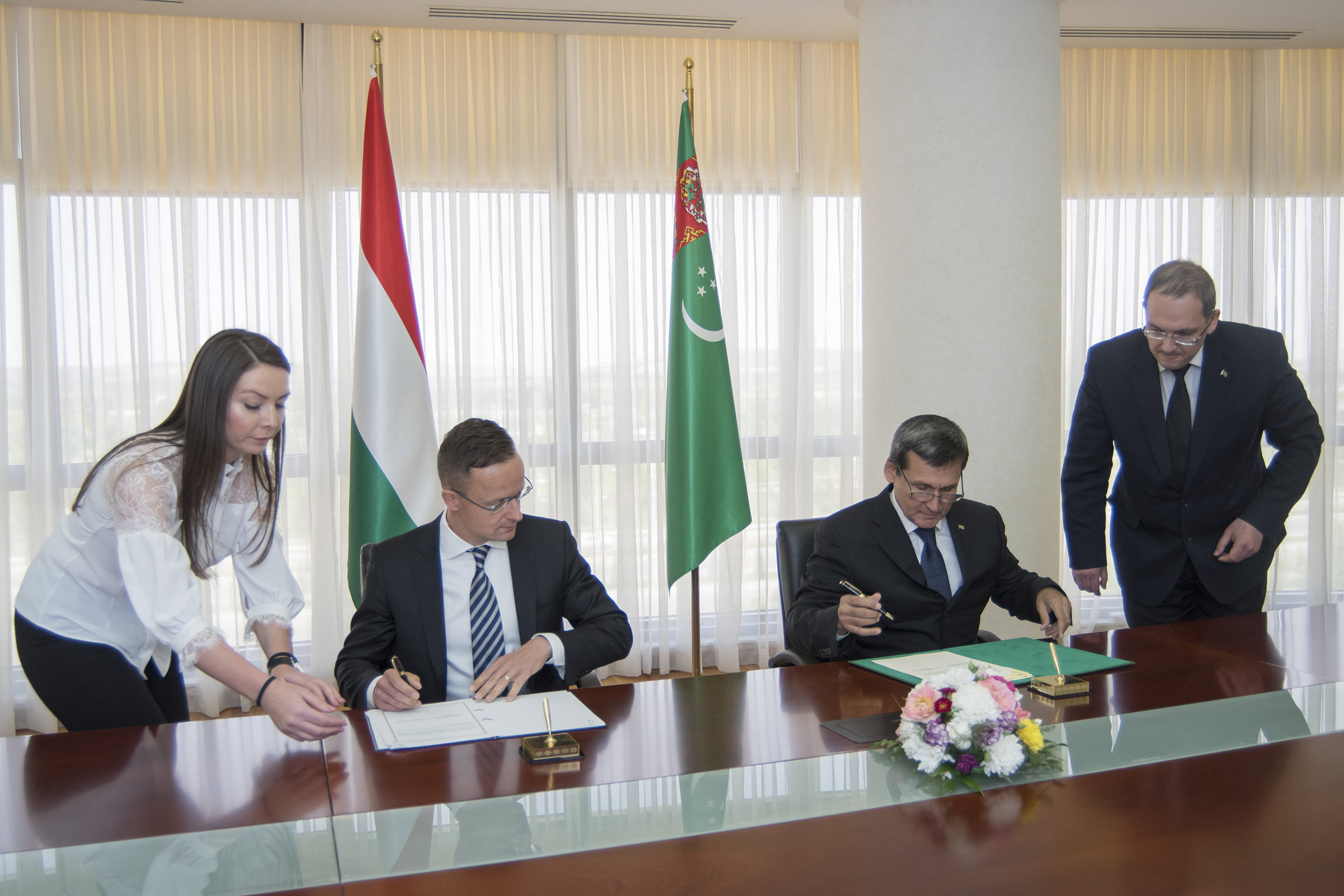Hungary is interested in developing closer ties with Turkmenistan, namely in the fields of energy and transportation.
“Hungary considers Central Asia, and especially Turkmenistan, as a very important country of the region from the viewpoint of the European security,” Hungary’s minister of foreign affairs and trade, Péter Szijjártó, told journalists at a press conference after a meeting with Turkmenistan's President Gurbanguly Berdimuhamedow in Ashgabat on Monday.
“At the meeting with the Turkmen leader, we have also discussed the cooperation in the field of energy. We are looking forward that gas resources of Turkmenistan will feed the common energy flow of Central Europe,” he added.
But Hungary is not stopping with energy – a sector that forms a large chunk of the country’s gross domestic product.
“One of the forms of which, is manufacturing of pharmaceutical products, where Hungarian state-owned pharmaceutical companies are working productively and one of the largest firms in the European market,” Szijjártó said.
“Here, in the neighbourhood of Afghanistan, central Asian countries have a crucial role in controlling radical, extremist ideologies and terrorist organizations, and most importantly in preventing terrorists from illegally migrating to Europe,” Szijjártó added, according to Daily News Hungary.
Berdimuhamedow and Szijjártó reportedly discussed regional initiatives like the Council of Turkic-speaking countries, to which Hungary is an observer. Hungary is also an integrated partner in the Belt and Road Initiative, the world's largest global trade network, spearheaded by China and stretching all the way to Europe.
The Hungarian minister said that its country established credit line in the amount of $46 million in one of the Hungarian banks to finance direct commercial ties and projects.
“As concerns transport, we are currently working on drafts of two agreements in the field of civil aviation and road transportation, which will be stimulating the connectivity of two countries. We will continue negotiation of the issue of water management,” he said.
"It would be extremely important for Hungary to receive gas through the Southern Corridor from Turkmenistan, an opportunity to receive supplies from sources other than Russia", the foreign minister said, according to Daily News Hungary.
Szijjártó noted Turkmenistan’s significance in terms of energy supplies for Europe and said that the country “opens up new opportunities” in light of “failed attempts to diversify” those supplies.
“If a 60 km pipeline could be built between Turkmenistan’s gas fields and Azerbaijan, Turkmenistan’s huge natural gas reserves could contribute to supplies for Europe, including central Europe,” he added.
The governments of Hungary and Turkmenistan have agreed on principles of the latter country contributing to Europe’s gas supplies with details to be discussed in the two countries’ mixed committee in October.
Hungary is interested in increasing imports of products of the chemical industry, oil and gas processing from Turkmenistan. In 2016, the two countries signed an intergovernmental convention on the avoidance of double taxation and the prevention of tax evasion with respect to taxes on income and capital.
Turkmenistan seems to be changing its policy by attracting foreign investment and resuming gas exports to neighboring Iran and Russia, announced earlier this year. Turkmenistan is taking measures to enhance the investment activity of small and medium-sized businesses as well. As of 2018, more than 1,015 enterprises subordinated operate in the agro-industrial sector.
Local companies are focused on the production of a wide range of agricultural and food products that satisfy the needs of the country's market. Some 597 enterprises are functioning in the industry sector, in particular in the area of the production of building materials, textiles and carpets, chemicals, metal products, furniture, faience, glass products, and polyethylene and plastic products to meet demands in the domestic and foreign markets.
According to the state program of Turkmenistan, by 2020, the share of the non-state sector of the economy in the volume of the gross domestic product should reach 70 percent. Local entrepreneurs are allowed to establish joint ventures with foreign partners by attracting their investments.







 Russian peacekeeping forces, deployed in the Karabakh (Garabagh) region of Azerbaijan since 2020, have commenced their withdrawal from the area.
Russian peacekeeping forces, deployed in the Karabakh (Garabagh) region of Azerbaijan since 2020, have commenced their withdrawal from the area.
 The number of evacuees from flooded areas in Kazakhstan has reached 97,852 people, including about 32,856 children since March 27.
The number of evacuees from flooded areas in Kazakhstan has reached 97,852 people, including about 32,856 children since March 27.
 Iran's senior military leaders described the drone and missile attack on Israel on April 14 night as “successful".
Iran's senior military leaders described the drone and missile attack on Israel on April 14 night as “successful".
 Azerbaijan officially unveiled the logo for the upcoming 29th session of the Conference of the Parties to the United Nations Framework Convention o...
Azerbaijan officially unveiled the logo for the upcoming 29th session of the Conference of the Parties to the United Nations Framework Convention o...
 Iranian President Ebrahim Raisi warned Israel that it would face a "real and extensive" response if it makes any "mistake" following Tehran’s missi...
Iranian President Ebrahim Raisi warned Israel that it would face a "real and extensive" response if it makes any "mistake" following Tehran’s missi...



